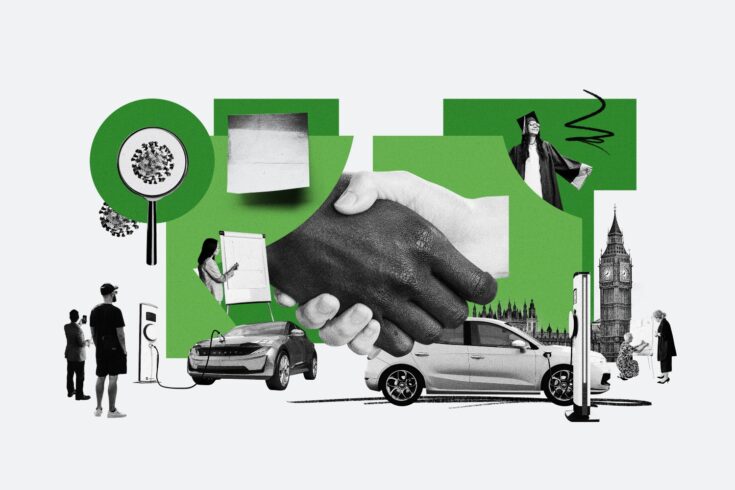The first thing I did when I finished my PhD was send my 200-page thesis on how people cope with financial shocks to a group of MPs. I’d undertaken my research around 2011 and 2012, not long after the 2008 financial crisis and the UK had been in recession. Only one MP replied and that was with a single line of thanks.
It was a lesson on how researchers and policymakers relate to each other and how we get the best out of that relationship.
10 years later
A little over ten years later, I am leading a team at the Economic and Social Research Council (ESRC) dedicated to ensuring researchers and policymakers get the best out of each other and ultimately benefit society.
After my PhD, I realised we needed to better train our researchers to engage with policymakers and achieve impact for their work. We are now increasingly moving away from a ‘push’ model where the researcher just sends academic outputs to policymakers.
Co-production, building a common understanding and shared goals, is often key. You identify early on the right people. You try to understand the questions they are asking and what outputs they would value. Ideally, you then work with them to make your outputs as actionable as possible.
There is increasing evidence, from the field of metascience, that this type of relationship has significant benefits for scientific progress too.
Gripped by policymaking
Before my PhD, I’d been a researcher for businesses, but policy had gripped me, and I set about a career working for government. I first joined the Department for Transport (DfT) and then what was at the time the Ministry of Housing, Communities and Local Government (MHCLG).
At DfT I was ‘future gazing’, looking at:
- how autonomous vehicles might change behaviour
- how people might work or watch films as they travelled in their vehicles
- what electrification might mean for future road networks
- how future transport could adapt to an ageing population
We were bringing in academic expertise to help us to answer these questions.
At MHCLG, I was working on emergency response. We needed quick answers from the research community on serious questions. I worked on the Novichok response, the partial collapse of Toddbrook Reservoir in Whaley Bridge, and on the COVID-19 response.
COVID-19 was a lesson in how research and innovation can play a crucial role at a time of crisis. The response from the research community was outstanding.
ESRC and UK Research and Innovation (UKRI) had talked to the government’s chief scientists and to policymakers to understand the questions they were asking before it went out with its emergency COVID-19 funding opportunity. This meant the research that was funded had easier routes to impact.
We know where government wants help
The government is investing around £15 billion a year in research and innovation. We can use that investment and that evidence and expertise to refine and hone our response to serious challenges such as:
- global warming
- geopolitical tensions
- a rise in infectious diseases
- the impact of artificial intelligence
We are seeing more and more requests from policymakers for scientific evidence about these challenges.
We know from the government’s ‘areas of research interest’ questions what policymakers are thinking, what their priorities are and where they need help.
Some researchers fear losing their academic independence if they work with government. However, if you look at what researchers are focused on, what their passion is, it’s often linked to a government policy challenge.
Why wouldn’t you want your work to improve the lives of people across the country? Policymakers also value academic independence, rigour, and critical challenge. As an academic, it is possible to be both independent and have impact.
Policy fellowships are proving popular
We are doing a lot of things right. We have an excellent research and development system in the UK, excellent talent, excellent discovery research. But there is still more we can do to bring researchers and policymakers together to generate impact from our research.
In 2021, we launched a policy fellowship pilot scheme that saw 24 researchers embedded in government departments for 18 months to design policy relevant research. It was a big success with the research community and government.
For our 2023 policy fellowship opportunity we had a lot of demand from government and more than doubled the number of fellowships opportunities, in partnership with more than 20 government organisations. We’ve also extended the fellowships to other disciplines supported by UKRI, such as biotechnology, agriculture and arts and humanities.
Database is a powerful tool for both sides
In 2020 we embedded two areas of research interest (ARI) fellows, Professors Annette Boaz and Kathryn Oliver, in the Government Office for Science (GO-Science) to support refining of the government’s research questions.
Nearly all government departments now publish their areas of research interest. These questions are helping to strengthen connections between researchers and government.
We’ve just launched a new areas of research interest database developed by the ARI fellows, working with GO-Science, ESRC and a technology start-up, Overton.
It’s a powerful new tool that I would urge all policymakers and researchers to use.
It brings together more than 1,500 published government areas of interest and categorises them. It also builds on Gateway to Research, UKRI’s project information dataset. It uses some clever algorithms to link the two.
It allows researchers to identify research problems that UK government departments and public bodies are interested in solving, including relevant teams in government that can use their research. It allows policymakers to find UKRI-funded research relevant to problems they are trying to solve.
We are hoping developments in artificial intelligence mean this type of database will ultimately answer a question from a policymaker with a rapid review of what the evidence is saying. That would be a step change.
Mobility of ideas and people is crucial
I and my team look to the Nobel Prize-winning geneticist Sir Paul Nurse for inspiration. In his independent review of the UK research, development and innovation landscape, he refers to the importance of ‘permeability between sectors, research disciplines and beneficiaries of research’. This is often also referred to as porosity or mobility.
The work of my team is driven by the belief that permeability and mobility of people and ideas are crucial to a well-functioning society.
Top image: Credit: UKRI




